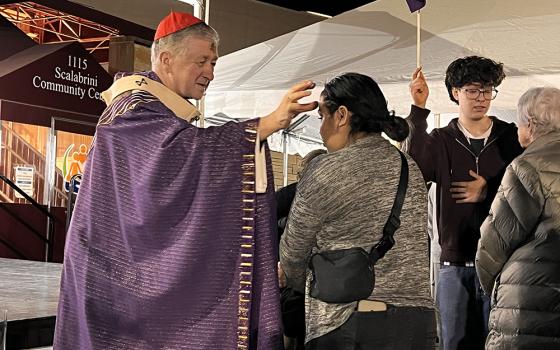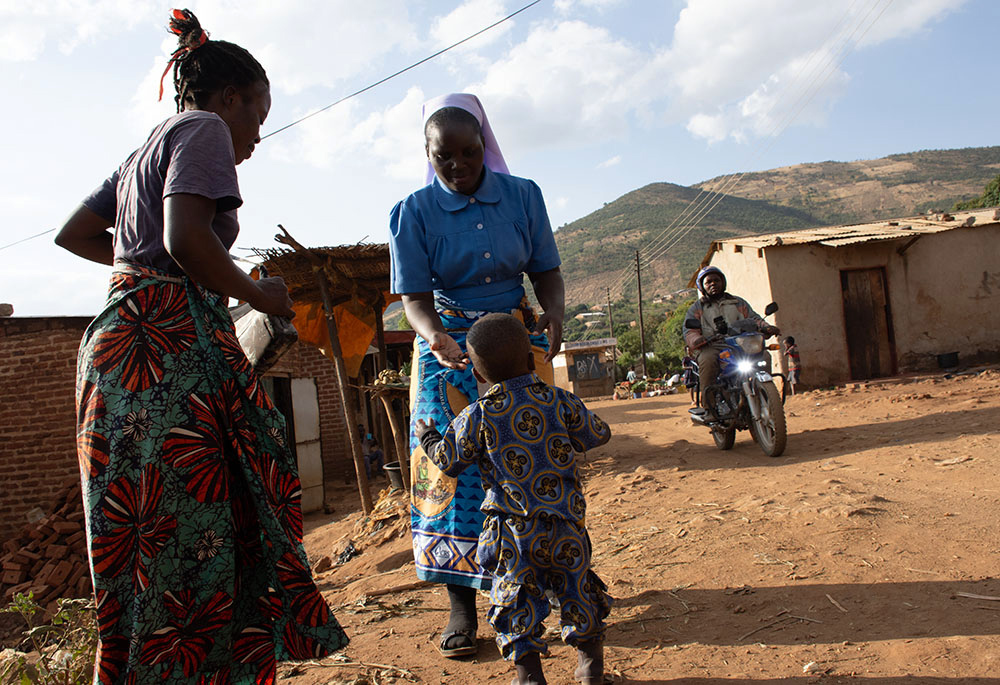
Elias Tembo and his mother, Catherine Mwale are pictured with Sr. Christabel Kazembe. Tembo and Mwale are beneficiaries of the Strengthening the Capacity of Religious Women in Early Childhood Development. The project trains mothers on early childhood nutrition, including the importance of locally sourced foods and complementary feeding practices. (Derrick Silimina)
As the morning sun glows over the lush rolling hills of the Chipata district, Sara Mbewe gently sways her baby boy, Raphael Zimbili, on her back after feeding him at her home in Kapata township — 575 km (about 357 miles) east of Zambia's capital, Lusaka.
"My son had a fragile start, [born] prematurely at just seven months, with a low birth weight in April 2022 and had to be placed in an incubator," Mbewe told Global Sisters Report.
Mbewe was unable to produce breast milk during this critical time, leaving Raphael at risk of severe malnutrition. It was at this moment that the Strengthening the Capacity of Religious Women in Early Childhood Development (SCORE-ECD) project became a turning point for her son.
Mbewe received vital training on early childhood nutrition, including the importance of locally sourced foods and complementary feeding practices, which significantly improved Raphael's health. She was guided on introducing complementary feeding at six months, including porridge enriched with groundnuts, soy, eggs, beans, pumpkin, and even traditional protein sources like caterpillars.
"By October 2022, my child's weight steadily increased thanks to the ECD's lessons and [their] community health volunteers," she said.
Mbewe learned techniques for breastfeeding low-birthweight babies and supplementing with goat milk as her breastfeeding capacity increased. As a result, Raphael's weight increased by the age of 3, from 1.4 kg to 8.2 kg (about 3 pounds to 18 pounds), and he is now healthy, can walk and interact confidently.
Advertisement
Despite the financial hardships and emotional toll, Raphael's father, David Zimbli, expressed deep gratitude, noting that he had lost hope due to his son's poor health and feeding struggles, but now sees light at the end of the tunnel.
"It was not easy, but the SCORE-ECD project helped us in ways we didn't expect. The community health volunteers gave us strength, knowledge and encouragement. Looking at how far Raphael has come, my boy is able to walk on his own and live a healthy life," Zimbili told GSR.
Supported by the Conrad N. Hilton Foundation, coordinated by Catholic Relief Services, and implemented by the Association of Consecrated Women in Eastern and Central Africa, the initiative leverages the trust and influence of religious sisters in rural communities. (The Hilton Foundation is a substantial funder of Global Sisters Report.)
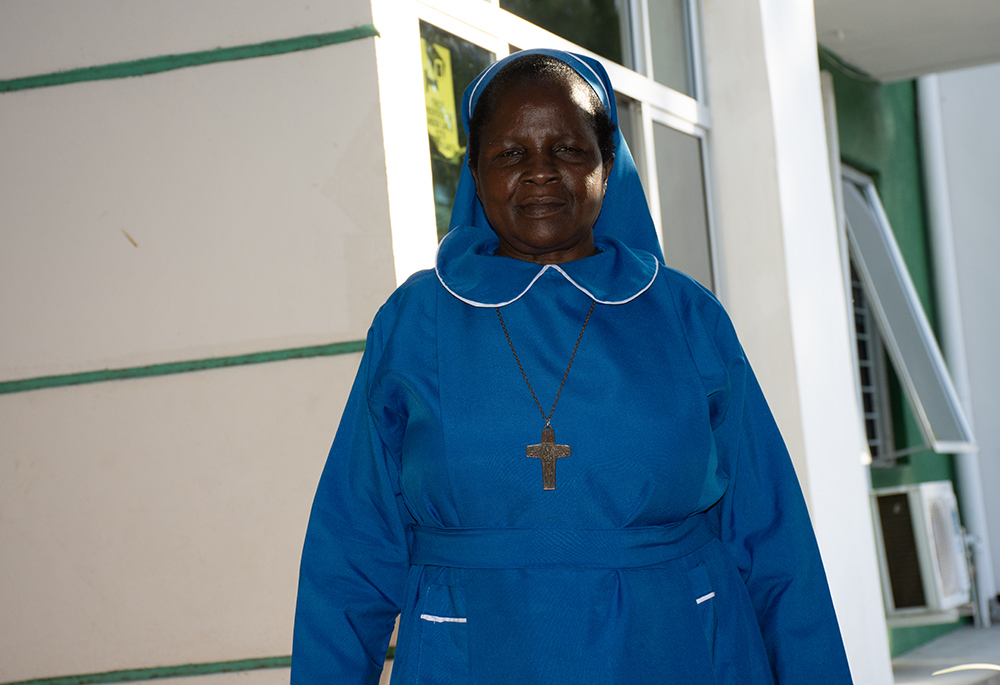
Good Shepherd Sr. Sarah Phiri, the SCORE-ECD project trainer for the Eastern province, is motivated by witnessing how mothers gain confidence and develop parenting skills, and how their children thrive in their physical, emotional and intellectual development. (Derrick Silimina)
Good Shepherd Sr. Sarah Phiri, the project's trainer for the Eastern province, is upbeat that the program has reached some of the most vulnerable people in remote communities. She is motivated by witnessing how mothers gain confidence and develop parenting skills, and how their children thrive in their physical, emotional and intellectual development.
"This project is a powerful avenue to transform [the lives of] parents who lacked basic knowledge on child development but are now champions in their communities. Children once malnourished are now thriving thanks to improved feeding practices and caregiver education," Phiri told GSR.
Phiri said the program is holistic, inclusive and community-centered as it integrates health, nutrition, positive parenting and spiritual support to ensure children under 3 develop to their full potential.
"The project uplifts women and builds stronger families. We have also seen increased male involvement, which is a positive shift in our cultural norms," she said.
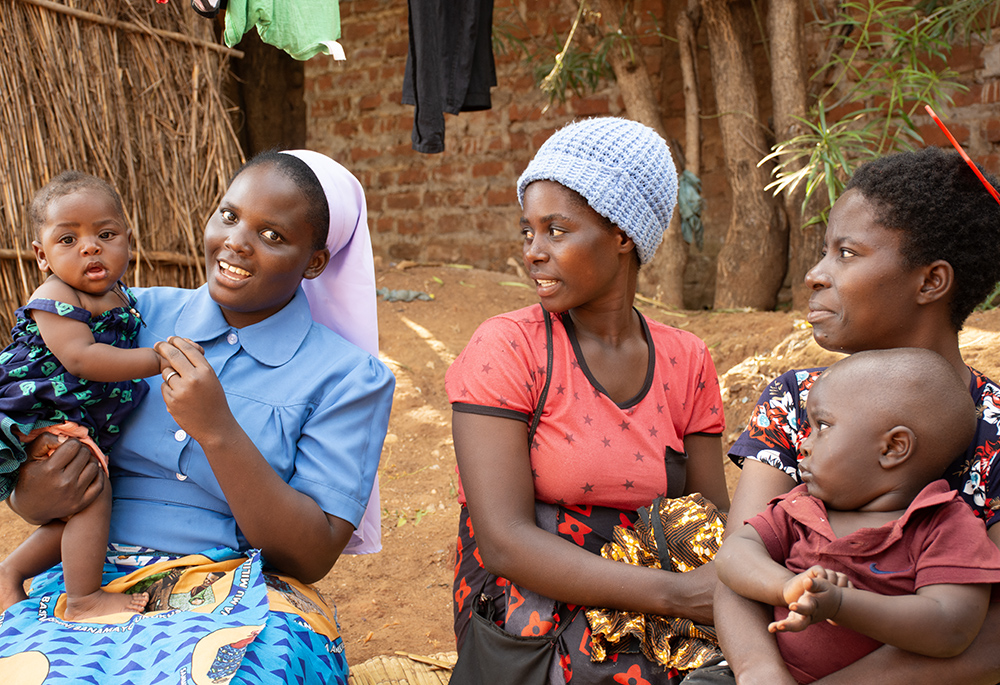
Sr. Christabel Kazembe and SCORE-ECD beneficiaries Zione Lungu and Tamara Njovu (Derrick Silimina)
The initiative not only improves early childhood development but also contributes to women's empowerment and strengthens families across four provinces, including Copperbelt (Ndola), Luapula (Samfya), Central province (Kaparu), and Eastern province (Chipata and Kalichero).
Elias Tembo of New Jim, a slum area west of Chipata District, is among 600 children (out of over 3,000 children served) who are direct beneficiaries of the initiative.
The program enabled Tembo's mother, Catherine Mwale, to recognize that he had hypotonic cerebral palsy, impacting his ability to sit and stand properly. "It was a challenging and emotional time for us, as we were worried about our child's future and well-being," Mwale told GSR.
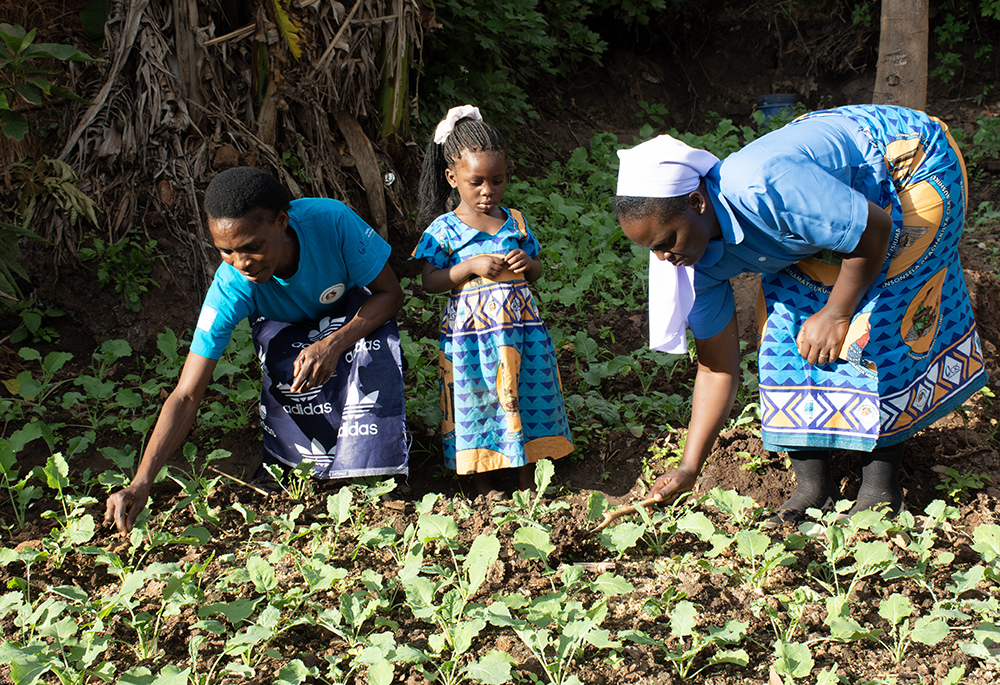
Sr. Christabel Kazembe joins SCORE-ECD beneficiary Alice Soko in the vegetable garden, a source of healthy food for mothers and their children. (Derrick Silimina)
The sisters brought Tembo, 2, to the Cheshire Homes Society of Zambia, operated by the Sisters of St. John the Baptist, who later brought him to Lusaka for a vital medical operation. The successful surgery marked a significant turning point in his development, as he can now sit and stand unaided — milestones that were previously unattainable and highlight the positive impact of early detection, intervention and access to specialized health care provided through the initiative.
"We are deeply grateful to the SCORE-ECD project for linking us to the Cheshire Homes, where Elias got the life-changing help he so desperately needed, a testament to the power of the sisters' humanitarian work amid challenges posed by our child's disability," Mwale said.
Nearly 2,500 non-beneficiaries have benefited indirectly from the project, demonstrating its broader community influence across the four provinces where it is currently being implemented.
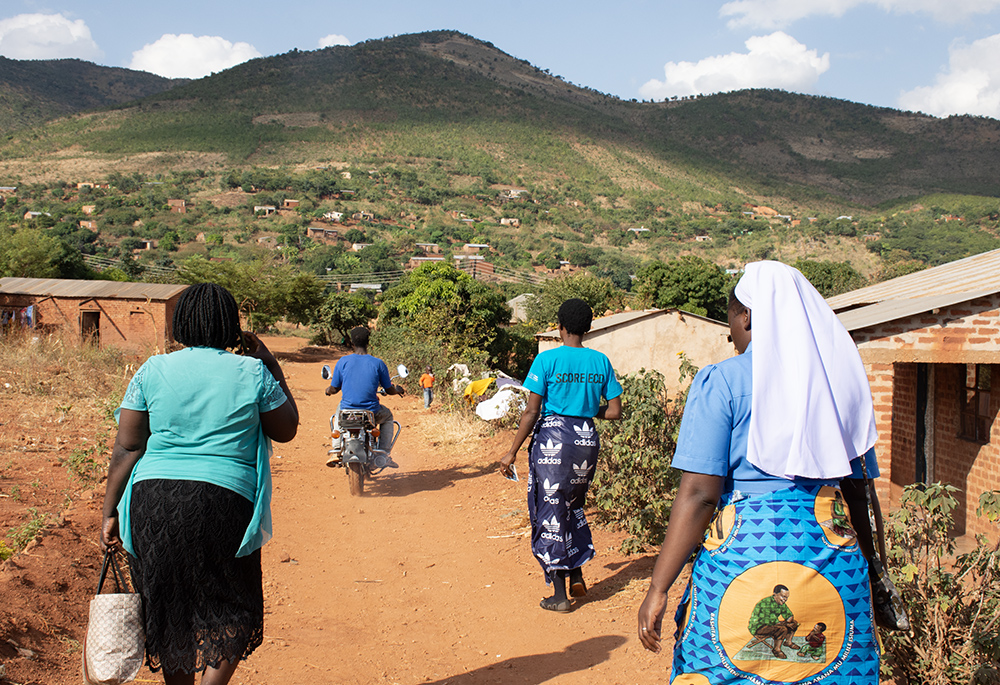
Sr. Christabel Kazembe and SCORE-ECD beneficiaries walk in the remotest parts of Chipata during a baseline assessment. (Derrick Silimina)
Project manager Christabel Kazembe of the Sisters of Mercy in the Mansa Diocese works with the Zambia Association of Sisterhoods, and said the project has improved the capacity of African sisters to provide inclusive, high-quality and nurturing care to children up to age 5, with a particular focus on children in vulnerable situations.
"I've been able to reach some of the most vulnerable people in remote communities," Kazembe said, adding that she finds joy in being part of a project that empowers mothers, adolescent girls, and caregivers with the knowledge and skills needed to care for their children.
Kazembe said her congregation's charism of compassion is the foundation of the project's work, which motivates them to respond to the needs of vulnerable children and mothers with love, dignity and empathy.
"We accompany families, especially in rural and underserved areas, offering not only services but also presence, listening and hope. This has been a powerful avenue through which this charism reflects in practical and impactful ways," she said.




